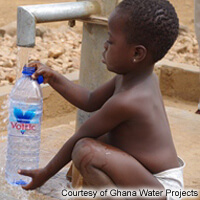Ghana Water Projects

Project Information
Providing communities, schools and clinics with boreholes or filters for safe drinking water
Describe the need affecting community
How will this Advance project help to address the need?
The Methodist Church Ghana, as a faith-based institution, sees the right to safe water and adequate sanitation as a fundamental issue of human worth, dignity and justice. Our projects are designed to assist communities and institutions to recover their sense of pride in their community by providing assistance to meet the basic human needs for water and sanitation.
Describe the primary goal of the project
To help Ghana achieve universal coverage for water and sanitation by: 1) Providing safe reliable drinking water to communities, schools and clinics in Ghana that otherwise are forced to use a less desirable or less reliable source of water. 2) Providing sanitation facilities and raising community awareness and education about the harm of open defecation. Which is contributing to the health and welfare of the communities served.
Describe the change you would like to see in the community as a result of this Advance project
We would like to see communities take pride in their water and sanitation facilities, keeping them clean and sanitary and in good working order. We would like to see water points still in use 5 years after installation. We would like to see healthier outcomes for children under 5 in the intervention communities, particularly those that receive both water and sanitation interventions. We would like to see a reduction in school absenteeism in schools where water and sanitation facilities are improved, as an indicator of project success.

